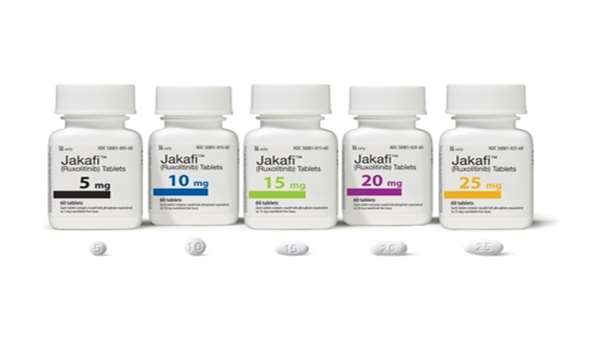FDA approves Jakafi for acute graft-versus-host disease
The FDA approved ruxolitinib for the treatment of steroid-refractory acute graft-versus-host disease among adults and children aged 12 years and older.
The FDA approved ruxolitinib for the treatment of steroid-refractory acute graft-versus-host disease among adults and children aged 12 years and older.
Ruxolitinib (Jakafi, Incyte) — a first-in-class JAK1/JAK2 inhibitor — is the first FDA-approved treatment for this condition. The drug also is indicated for treatment of polycythemia vera in adults who had an inadequate response to or are intolerant of hydroxyurea, as well as for adults with intermediate- or high-risk myelofibrosis.
Patients with steroid-refractory acute GVHD — a complication of hematopoietic bone marrow transplantation — can progress to severe disease, with a 70% 1-year mortality rate.
“For the first time, patients with steroid-refractory acute GVHD, and the physicians that treat them, have an FDA-approved treatment for this serious disease,” Hervé Hoppenot, CEO of Incyte, said in a press release. “This approval is also an important milestone for Incyte, as it marks the third indication for Jakafi in the United States, further underscoring Incyte’s commitment to delivering innovative medicines for patients in need. We are proud of the impact Jakafi has had on patients’ lives to-date and are dedicated to advancing our ongoing research in JAK inhibition to serve more GVHD patients in the future.”
FDA based the approval, in part, on data from REACH1, an open-label, single-arm, multicenter study that evaluated the combination of 5 mg twice-daily ruxolitinib — increased to 10 mg twice daily in 3 days if tolerable — and corticosteroids among 71 patients with steroid-refractory grade 2 to grade 4 acute GVHD. Forty-nine of the patients were refractory to steroids alone, 12 had received two or more prior therapies for GVHD, and 10 did not meet the FDA’s definition of having steroid-refractory GVHD.
Overall response rate — based on Center for International Blood and Marrow Transplant Research criteria — served as the study’s primary endpoint.
Results showed a 57% ORR at 28 days among the 49 steroid-refractory patients; this included a 31% complete response rate.
The most common adverse events among the total study population were infections (55%) and edema (51%). Common laboratory abnormalities included anemia (75%), thrombocytopenia (75%) and neutropenia (58%).
“Every year in the United States, about half of the people who develop acute GVHD do not respond adequately to steroids, making it an extremely challenging disease to treat,” Madan Jagasia, MBBS, MS, MMHC, lead investigator on the REACH1 trial and professor of medicine at Vanderbilt University Medical Center, and chief medical officer of Vanderbilt-Ingram Cancer Center, said in the release. “While allogeneic stem-cell transplants have the potential to transform people’s lives, the onset of acute GVHD can significantly impact their prognosis. I am excited that we now have Jakafi as a new treatment option for [patients with] acute GVHD that do not respond to corticosteroids who, until now, have had limited choices.”





ارسال به دوستان